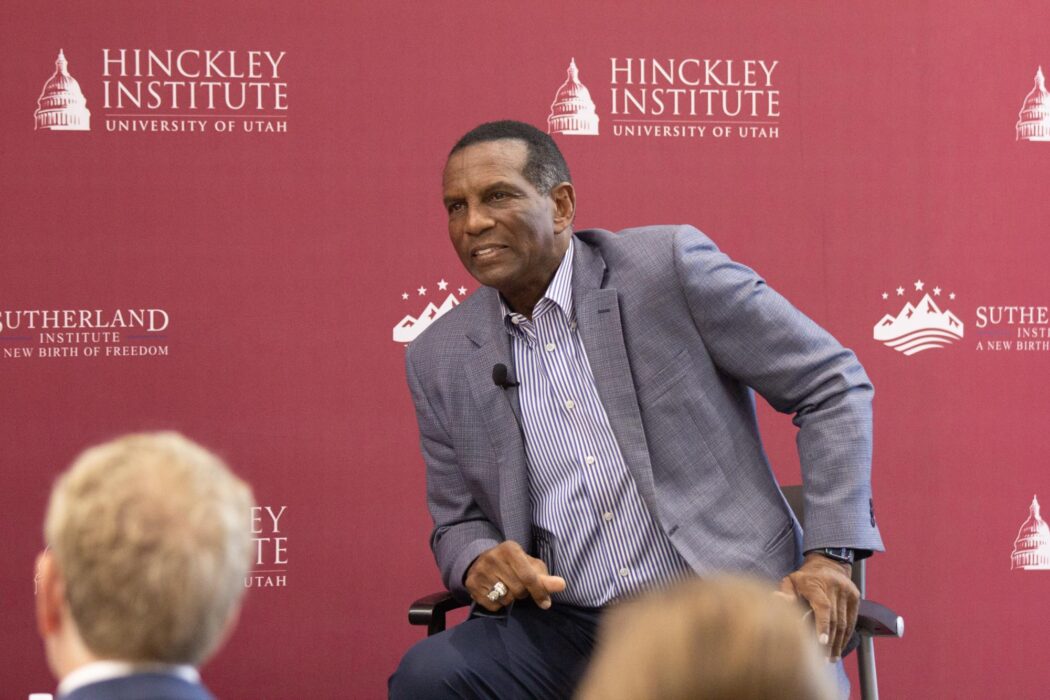Burgess Owens Talks Education at 2024 Congressional Series
This story is published as part of U.S. Democracy Day and the Utah College Media Collaborative, a cross-campus project bringing together emerging journalists from Salt Lake Community College, the University of Utah, Utah State University and Utah Tech University.
The Hinckley Institute of Politics and Sutherland Institute kicked off their 2024 Congressional Series on Tuesday with a conversation with Congressman Burgess Owens, where he discussed his views on DEI, the value of a four-year education and K-12 policy.
Education Policy at the College Level
Owens spoke on H.B. 261 and DEI regulations in response to an audience member who pointed out “a discrepancy” between his views on “state control” and his opposition to diversity, equity and inclusion.
In response, Owens shared his memories of being the third Black student to attend the University of Miami.
“The minute we go back to judging each other based on skin color, our religion, maybe our southern character, we’re headed down a dark and hideous path,” he said.
Owens added that the free market could decide DEI.
“If an institution wants to teach DEI, that is fine,” he said. “[They] just won’t have the federal funding. If the free market says that’s the way to go, I will venture not too many people will put their kids in a school like that.”
During the discussion, Christine Cooke Fairbanks, the education policy fellow at the Sutherland Institute and conversation moderator, asked if college was still worth attending.
Owens said students leave college with debts they can never repay, and their return on investment is typically poor.
“That’s why we have the College Reduction Act,” he said.
The College Cost Reduction Act was proposed in January 2024. According to the American Council on Education, it’s a comprehensive bill that aims to overhaul the student loan process and restrain college costs.
K-12 Education Policy
Owens discussed the Educational Choice for Children Act (ECCA), a proposed solution to the declining quality of education since the COVID-19 pandemic.
“Districts in D.C. and Baltimore [have] zero proficiency in math … it’s not that they’re not talented enough to do it. They’re not being taught,” Owens said.
Owens added the ECCA will allow Congress to create a scholarship-granting organization (SGO). Those who invest in this SGO can receive a 1% tax credit. These investments will allow any child or parent to choose where the child goes to school without drawing funding from the school districts.
According to Invest in Education, ECCA grants scholarships to students that allow them to attend schools that meet their educational needs as determined by their parents.
Fairbanks asked Owens how Congress intends to “empower and equip” parents involved in their child’s education.
“We have been putting something together called the Parents Bill of Rights,” Owens said.
According to the bill summary, the Parents Bill of Rights “clarifies that parents have a right to know what is happening in their child’s school and maintain the right to make decisions about their child’s education.”
Owens explained that parents should have the right to know if their child is being taught something that goes against their core values, to know if there is violence in the school system and to protect their child’s privacy.
“There’s no one who loves their kids more than their parents,” Owens said. “We all know that.”
Elle Crossley reported and wrote this story as a journalism student with The Daily Utah Chronicle at the University of Utah. Her article is part of U.S. Democracy Day, a nationwide collaborative on Sept. 15, the International Day of Democracy, in which news organizations cover how democracy works and the threats it faces. To learn more, visit usdemocracyday.org.


